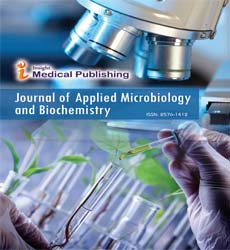ISSN : ISSN: 2576-1412
Journal of Applied Microbiology and Biochemistry
A Note on Streptococcus suis Infection
Lin Teng*
Department of Medicine, Shanghai Jiao Tong University School of Medicine, Shanghai, 200025, China
- *Corresponding Author:
- Lin Teng
Department of Medicine
Shanghai Jiao Tong University School of Medicine
Shanghai, 200025, China
E-mail: LinTeng643@gmail.com
Received Date: December 04, 2021; Accepted Date: December 18, 2021; Published Date: December 25, 2021
Citation: Teng L (2021) A Note on Streptococcus suis Infection. J Appl Microbiol Biochem Vol.5 No.12:60.
Commentary
Streptococcus suis infection is a zoonotic disease caused by the Streptococcus suis bacterium. In Hong Kong, it is a notifiable infectious disease. Meningitis is the most common complication of the disease, which is characterised by fever, headache, and vomiting. It can also cause skin bleeding and, in rare cases, sepsis, endocarditis, arthritis, bronchopneumonia, and toxic shock syndrome. Deafness is a common complication of Streptococcus suis infection, and it is likely to be permanent.
Transmission mode
Infection with Streptococcus suis is a common disease in pigs. The bacterium is carried in pigs' upper respiratory tracts and spreads between pigs via nose-to-nose contact or aerosol over short distances. Aside from pigs (including wild boars), it can occasionally be found in horses, dogs, cats, and birds.
Adults are the most commonly infected with Streptococcus suis. It is spread through direct contact and is frequently associated with skin wounds from handling infected pigs or other animals, raw pork, and other pig products. However, it can also be transmitted through ingestion or mucous membranes.
Groups at high risk
Pig breeders, abattoir workers, meat processing and transport workers, butchers, and cooks are among those at risk. Immunocompromised people, such as those who have had their spleen removed, as well as those with diabetes, cancer, and alcoholism, are at a higher risk of infection.
Incubation time
Time spans from a few hours to two weeks.
Management
Antibiotics can be used to treat Streptococcus suis infection.
Prevention
There is no human vaccine against Streptococcus suis. To reduce the risk of infection, the general public should take the following precautions:
Keep good personal hygiene: Hand hygiene should be practised on a regular basis, especially before touching the mouth, nose, or eyes. Hands should be washed with liquid soap and water and rubbed for at least 20 seconds. Then, rinse with water and dry with a paper towel or hand dryer. Hand hygiene with 70 to 80 percent alcohol-based hand rub is an effective alternative if hand washing facilities are not available or when hands are not visibly soiled.
• Contact with pigs (including wild boars) and other animals should be avoided. Otherwise, wash hands as soon as possible after contact with liquid soap and water.
• Avoid injury by wearing gloves when handling pigs or raw pork.
• Before handling raw pork, properly cover wounds with waterproof adhesive dressings.
Keep good food hygiene: To prevent foodborne diseases, always follow the "5 Keys to Food Safety" when handling food (including pork), which are:
â? Choose (choose safe raw materials)
â? Clean (keep hands and utensils clean)
â? Separate (separate raw and cooked food)
â? Cook (cook thoroughly) and
â? Safe Temperature (keep food at safe temperature)
• Food should be purchased from hygienic and trustworthy sources. Do not support illegal hawkers.
• Raw pork should be kept in tightly sealed containers and refrigerated at 4°C or lower.
• Raw and cooked pork should be handled and stored separately.
• Surfaces, utensils, and equipment in contact with raw pork should be thoroughly cleaned.
• Pork should be thoroughly cooked before eating.
Open Access Journals
- Aquaculture & Veterinary Science
- Chemistry & Chemical Sciences
- Clinical Sciences
- Engineering
- General Science
- Genetics & Molecular Biology
- Health Care & Nursing
- Immunology & Microbiology
- Materials Science
- Mathematics & Physics
- Medical Sciences
- Neurology & Psychiatry
- Oncology & Cancer Science
- Pharmaceutical Sciences
